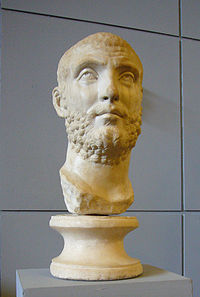Carinus: Difference between revisions
links; caveat re the sources |
m →Reign |
||
| Line 25: | Line 25: | ||
==Reign== |
==Reign== |
||
[[Image:CarinusAureus1.jpg|thumb|left|300px|Aureus of emperor Carinus.]] |
[[Image:CarinusAureus1.jpg|thumb|left|300px|Aureus of emperor Carinus.]] |
||
He fought with success against the Germanic [[Quadi]] tribes,<ref name ="leadbetter" |
He fought with success against the Germanic [[Quadi]] tribes,<ref name ="leadbetter">{{cite book |title=Carinus (283–285 A.D.) ||last= Leadbetter|first= William |authorlink= |coauthors= |year=|publisher= |location= |isbn= |url=http://www.roman-emperors.org/carinus.htm |page= }}</ref> but soon left the defence of the Upper [[Rhine]] to his legates and returned to [[Rome]], where the surviving accounts, which demonize him, assert that he abandoned himself to all kinds of debauchery and excess. More certainly, he also celebrated the annual ''[[ludi Romani]]'' on a scale of unexampled magnificence.<ref>{{cite book |title=Early Christianity and Paganism ||last= Spence|first= H. Donald M.|authorlink= |coauthors= |year=2003|publisher=Kessinger Publishing |location= |isbn=0766130681 |url= |page=391–392 }}</ref> |
||
After the death of Carus, the army in the East demanded to be led back to Europe, and [[Numerian]], the younger son of Carus, was forced to comply.<ref>{{cite book |title=The Roman Empire from Severus to Constantine ||last= Southern|first= Pat|authorlink= |coauthors= |year=2001|publisher=Routledge |location=New York |isbn=041523944-3|url= |page=133 }}</ref> During a halt at [[Chalcedon]], Numerian was found dead, and [[Diocletian]], commander of the body-guards, claimed that Numerian had been assassinated and was proclaimed emperor by the soldiers.<ref>{{cite book |title=Constantine||last= Pohlsander|first=Hans A.|authorlink= |coauthors= |year=1996|publisher=Routledge|location= |isbn=0415319382|url= |page=6 }}</ref> |
After the death of Carus, the army in the East demanded to be led back to Europe, and [[Numerian]], the younger son of Carus, was forced to comply.<ref>{{cite book |title=The Roman Empire from Severus to Constantine ||last= Southern|first= Pat|authorlink= |coauthors= |year=2001|publisher=Routledge |location=New York |isbn=041523944-3|url= |page=133 }}</ref> During a halt at [[Chalcedon]], Numerian was found dead, and [[Diocletian]], commander of the body-guards, claimed that Numerian had been assassinated and was proclaimed emperor by the soldiers.<ref>{{cite book |title=Constantine||last= Pohlsander|first=Hans A.|authorlink= |coauthors= |year=1996|publisher=Routledge|location= |isbn=0415319382|url= |page=6 }}</ref> |
||
Revision as of 09:54, 28 September 2010
| Carinus | |||||
|---|---|---|---|---|---|
| Emperor of the Roman Empire | |||||
 Bust of Carinus. | |||||
| Reign | 282–284 (as Caesar of the west under his father); 284–285 (in competition with Diocletian) | ||||
| Predecessor | Carus / Numerian | ||||
| Successor | Diocletian | ||||
| Wife | |||||
| Issue | Marcus Aurelius Nigrinianus | ||||
| |||||
| Father | Carus | ||||
Marcus Aurelius Carinus (died 285) was Roman Emperor (283 – July, 285) and elder son of the Emperor Carus, on whose accession he was appointed Caesar and co-emperor of the western portion of the empire. Official accounts of his character and career have been filtered through the propaganda of his successful opponent, Diocletian.
Reign
He fought with success against the Germanic Quadi tribes,[1] but soon left the defence of the Upper Rhine to his legates and returned to Rome, where the surviving accounts, which demonize him, assert that he abandoned himself to all kinds of debauchery and excess. More certainly, he also celebrated the annual ludi Romani on a scale of unexampled magnificence.[2]
After the death of Carus, the army in the East demanded to be led back to Europe, and Numerian, the younger son of Carus, was forced to comply.[3] During a halt at Chalcedon, Numerian was found dead, and Diocletian, commander of the body-guards, claimed that Numerian had been assassinated and was proclaimed emperor by the soldiers.[4]
Carinus at once left Rome and set out for the East to meet Diocletian. On his way through Pannonia he put down the usurper Sabinus Iulianus, and encountered the army of Diocletian in Moesia.[1]
Carinus was successful in several engagements, and at the Battle of the Margus River (Morava), according to one account, the valour of his troops had gained the day, when he was assassinated by a tribune whose wife he had seduced. In another account, the battle is represented as having resulted in a complete victory for Diocletian, for Carinus' army deserted him: this second account is also confirmed by the fact that Diocletian kept Carinus' Praetorian Guard commander in service.[1]
Carinus has the reputation of having been one of the worst of the emperors. This infamy was possibly supported by Diocletian himself. For example, Historia Augusta has Carinus marrying nine wives, while neglecting to mention his only real wife, Magnia Urbica, by whom he had an only son, Marcus Aurelius Nigrinianus.
After his death, Carinus' memory was condemned and his name, along with that of his wife, was erased from inscriptions. [5]
References
Primary Sources
- Anonymous, Epitome de Caesaribus
- Aurelius Victor
- Eutropius, Breviarium ab urbe condita
- Historia Augusta, Life of Carus, Carinus and Numerian
- Joannes Zonaras, Compendium of History extract: Zonaras: Alexander Severus to Diocletian: 222–284
Secondary Sources
- This article incorporates text from a publication now in the public domain: Chisholm, Hugh, ed. (1911). Encyclopædia Britannica (11th ed.). Cambridge University Press.
{{cite encyclopedia}}: Missing or empty|title=(help)
- ^ a b c Leadbetter, William. Carinus (283–285 A.D.).
{{cite book}}: Cite has empty unknown parameters:|1=and|coauthors=(help) - ^ Spence, H. Donald M. (2003). Early Christianity and Paganism. Kessinger Publishing. p. 391–392. ISBN 0766130681.
{{cite book}}: Cite has empty unknown parameters:|1=and|coauthors=(help) - ^ Southern, Pat (2001). The Roman Empire from Severus to Constantine. New York: Routledge. p. 133. ISBN 041523944-3.
{{cite book}}: Cite has empty unknown parameters:|1=and|coauthors=(help) - ^ Pohlsander, Hans A. (1996). Constantine. Routledge. p. 6. ISBN 0415319382.
{{cite book}}: Cite has empty unknown parameters:|1=and|coauthors=(help) - ^ Varner, Eric R. (2004). Mutilation and Transformation : Damnatio Memoriae and Roman Imperial Portraiture. Brill Academic Publishers. p. 212. ISBN 9004135774.
{{cite book}}: Cite has empty unknown parameter:|coauthors=(help)
External links
![]() Media related to Carinus at Wikimedia Commons
Media related to Carinus at Wikimedia Commons
![]() Media related to Magnia Urbica at Wikimedia Commons
Media related to Magnia Urbica at Wikimedia Commons
